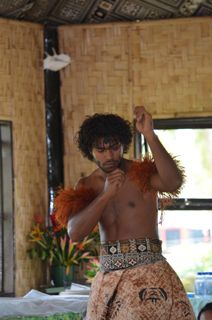Suva is the capital and largest city of the Fiji islands and is located in Rewa Province on the southeastern coast of Viti Levu Island, on Suva Point, near the mouth of the Rewa River. It is Fiji’s chief seaport, with excellent harbour facilities, making it a primary stop for transpacific shipping traffic and the Pacific Cruises. Modern Suva is the most ethnically diverse city in the Fiji Islands, with about equal numbers of Indians and Indigenous Fijians. The Fijians and Melanesians descent make up 50% of the population. Another 40% of the population is made up of Indians, whose ancestors were brought over in the late 1800s to work on British Plantations. The balance of 5% consists of Europeans and other Pacific Islanders. People settled on the Fiji Islands around 1000 BC; cultivated gardens, raised domestic animals and produced pottery. Dutch explorers sighted the islands in the 17th century. Europeans developed coconut, cotton and sugar plantations on the islands, and Britain annexed them in 1874 to obtain access to the port of Suva. Suva became the colonial capital in the late 1870s.
A few words on cannibalism. Until the 1920s, cannibalism was practiced in many South Pacific islands. The centuries-old practice was a completely normal part of life. Warriors were honoured with religious sacrifices of enemies following great battles. Stocks of captured enemies were usually kept on hand so there would be a good supply served for two occasions. The eating of foe served two purposes - not only was it believed that his strength would be transferred by the act, it was considered an indelible disgrace to the victim, his family and his descendants. Inter-island warfare as as clan struggles were common, so enemies were often the main course. Fijian cannibals were fierce, but the eating of human flesh was never necessary for food. Pronged cannibal forks, usually carved from Veti wood, the forks are soaked in a thick black mud for several weeks and then hand polished, come in various sizes. Smaller forks were used for eyes and brains, while larger implements suited big hunks of flesh.
Our all day tour today took us out of Suva (not really that much to see in the city) and a hour south to the small community of Navua. Here we boarded long boats and then headed up a very picturesque river for another hour to the largest waterfall in Navua for a swim. The weather was a mixed bag as we were in hot sunny skies one minute and then pounded with rain the next - note the big green garbage bags to not only put our stuff but to hide the cameras.
Coming back on the long boats we stopped at a traditional village to visit with the local Fijians and to share in some of their customs. First up was the culturally very important Kava ceremony. Made from the Kava root in a special Kava bowl, this event signifies the meeting and welcoming of outsiders to the village. We had to elect a tribe leader in our group to take the first ceremonious drink of Kava with the leader of the chief of the village we were visiting. The ending of the formal portion of the ceremony now meant that we were welcomed into the tribe and were then offered a delicious lunch followed by their traditional dance and then welcomed to participate in the dance because we were now as one. All very well done, corny and touristy, no this village has been here since the 1800s and although the village does extend out from this traditional area this is very much still their culture. Tourism is one of the main sources of income for these villagers and they have progressively opened their doors to welcome outsiders into their way of life. Well done.
As when we arrived we were welcomed and then sent off with the wonderful sounds of a full marching brass band.
We are currently repeating Tuesday as we cross the International Date Line, if it was your birthday today it would be 48 hours long. We are no longer ahead of our home local time but now behind it.
Tip or Comment of the Day. When visiting a village here modest dress is required and it is a good idea to carry a sulu (sarong) to cover up brief clothing. It is also very important to remove your hats and sunglasses as they indicate disrespect to the village chief.
Next port Pago Pago, pronounced, Pahngo Pahngo - American Samoa





































It was Lily's birthday yesterday!
ReplyDelete